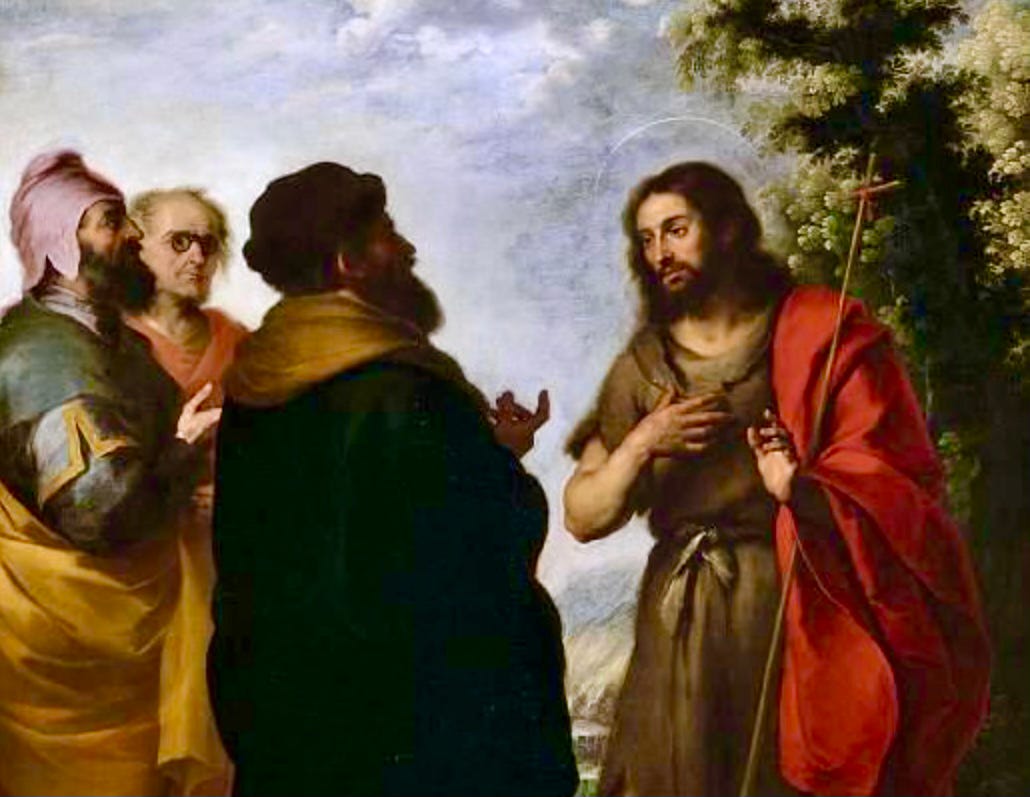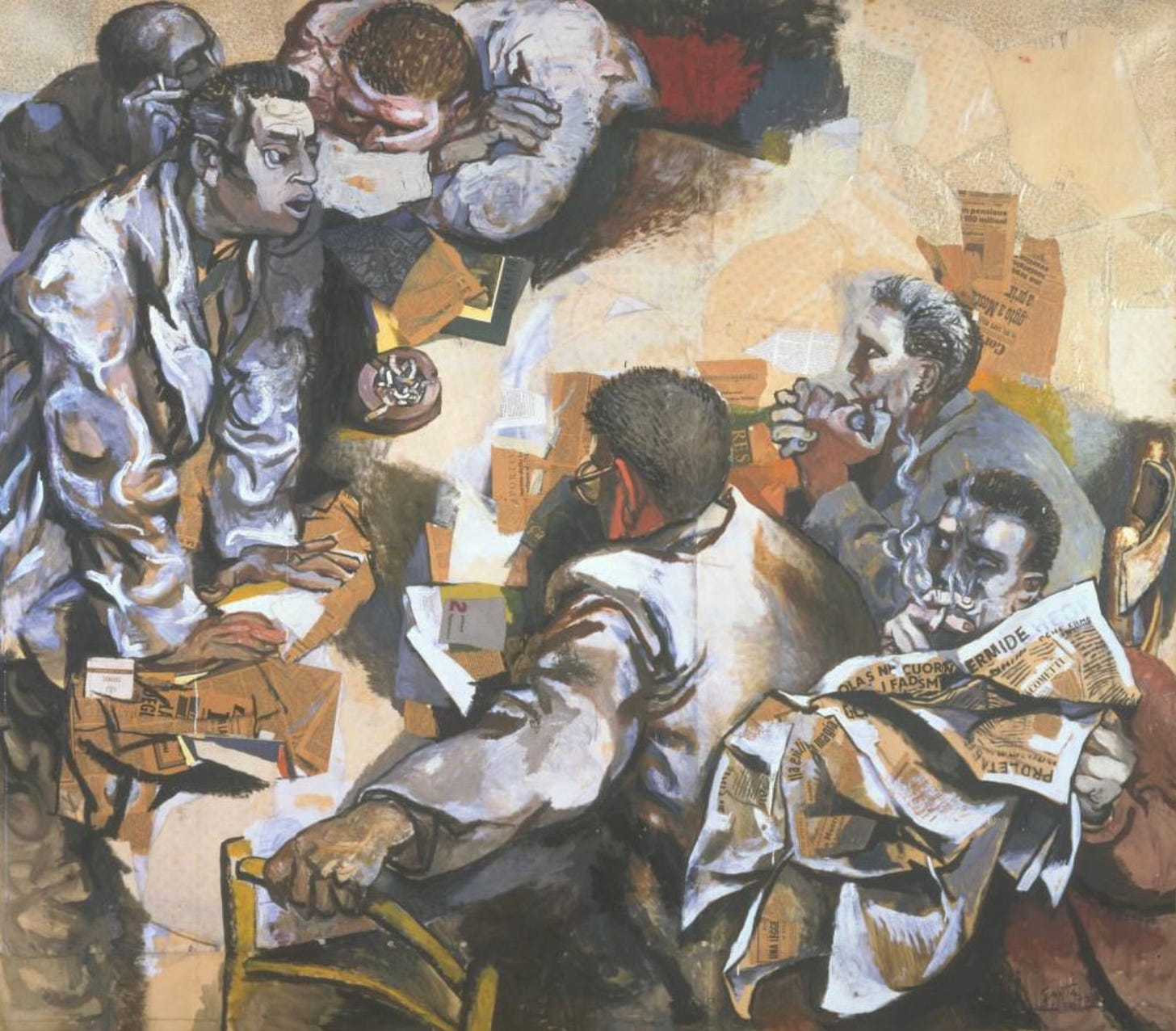John's Gospel as a jury trial
and the jury room as a model for public freedom
“. . . we speak of what we know, and testify to what we have seen, and yet you all reject our testimony.” — John 3:11 REB
The Gospel of John can be understood as a courtroom. Much of its language is juridical: the word “witness,” for instance, appears in John twenty-one times. The chief witness in John is Jesus. The jury are the people Jesus speaks to—Pharisees, Samaritans, disciples, Roman officials, and—we learn near the end, just before the coda chapter—us. There we learn that “These [signs] have been written so that you may believe,”1 a statement that resembles part of the last jury instruction read in many federal courtrooms before a jury begins its deliberations: “You are judges—judges of the facts.”
Jesus’s listeners in John are sometimes judges of both the facts and the law. The Pharisees at one point seem poised to make an evidentiary ruling: “You are testifying about Yourself; Your testimony is not true.”2 The Pharisees here parrot Jesus’s own evidentiary standard set out three chapters earlier: “If I alone testify about Myself, My testimony is not true”—“true,” the New American Standard version’s note tells us, in the sense of “admissible as legal evidence.”3 Jesus responds to the Pharisees’ objection on its terms, citing an evidentiary standard under the Mosaic covenant to suggest that the Father corroborates his testimony:
“Even in your law it has been written that the testimony of two men is true. I am He who testifies about Myself, and the Father who sent Me testifies about Me.”4
Jesus here cites an Old Testament evidentiary standard that was written for judicial hearings, and in doing so he broadens the Old Testament standard’s reach beyond strictly judicial matters.
In fact, John’s thoroughly juridical Gospel turns the world into a courtroom. Because a courtroom should be public space, John’s Gospel may be understood as an account of how Jesus creates public space, which is our common world, and as an invitation for us to participate in creating it, too.
Above: detail of St. John the Baptist with the Scribes and Pharisees by Bartolome Esteban Murillo
Jesus’s public space has its enemies. John’s Gospel, after all, is written in the context of empire. The Romans have swallowed up all public space and have regurgitated pieces of it solely for provincial administration and for other local, political purposes consistent with Rome’s rule. Jesus’s testimony and his expansion of public space threaten to deprive Israel of what few public spaces the Roman Empire permits, according to the religious leaders in John’s gospel. The chief priests and Pharisees understand Jesus’s words and deeds not as an expansion of public space but as a threat to its continued existence:
“If we let Him go on like this, all men will believe in Him, and the Romans will come and take away both our place and our nation.”5
Without a place and a nation, evidentiary standards such as the need for two or three witnesses would no longer matter. In the Roman Empire, the ultimate evidentiary standard its subjects live under is “might makes right.” Israel has plenty of evidence of Rome’s might.
The religious leaders’ solution to this problem, of course, is Jesus’s death. In a sense, then, Jesus dies for Israel’s public space, the same space he appeals to as a witness throughout John’s Gospel.
Courtrooms oppose authoritarians by insisting on “right”—that is, on justice—irrespective of might. A courtroom by its nature “rests on the assumption of personal responsibility and guilt, on the one hand, and a belief in the functioning of conscience, on the other,” as Hannah Arendt points out.6 Even the “simple fact of courtroom procedure,” which Jesus honors in the above sidebar conference with the Pharisees, tends to force everyone involved to look at “matters from a moral viewpoint,” she says.7 And as judges of the facts, juries are presumed to be both moral and candid.
Courtrooms threaten an authoritarian, then, because courtrooms inherently suggest an authority higher than the authoritarian. This higher authority is particularly evident in court systems that acknowledge some form of natural law, an unwritten law to which statutory and case law must conform. Most natural law systems include tenets of courtroom procedure,8 and authoritarians reject the values that animate courtroom procedure, such as due process and equal protection. Germany’s Third Reich, for instance, reduced the notion of justice from a set of universally held tenets to a state-specific concept. According to Hans Gerber, a professor in the regime’s service, “National-Socialism insists that justice is not a system of abstract and autonomous values such as the various types of Natural Law systems.”9 But Jesus in John reopens public space by making his case based on the kind of “abstract and autonomous values” that the Third Reich despised.
In the kingdom of God, the entire world becomes a courtroom applying such universal values. Note the connection between evidentiary rulings and the world-as-courtroom reflected in one of Isaiah’s prophecies concerning the Messianic age:
He will not judge by outward appearances or decide a case on hearsay; but with justice he will judge the poor and defend the humble in the land with equity . . .10
As a result, Isaiah says, “the earth will be full of the knowledge of the LORD / As the waters cover the sea.”11
It was this sense of the world as courtroom to which the Declaration of Independence makes its case against the British empire. It finishes its famous prologue with this lead-in to the end of its closing argument against the empire: “To prove this, let Facts be submitted to a candid world.”
Is the world still candid? The Greeks of Homer’s time understood the candid witness as necessary for immortality, and democratic Athens understood the witness as necessary for political continuity. Greek poetry and philosophy had no greater goal than man’s immortality.12 Men and women were known in the Greek world as mortals, sandwiched between the immortal gods and the sempiternal cycles of nature. Nature’s plants and animals die but then regenerate, so nature is immortal. But unlike the plants, animals, and gods, the Greeks and the rest of humanity die and don’t come back. But all was not lost.
Although a person could never become immortal, he could live closer to immortality by fulfilling the more godlike side of himself. Before philosophy, the Greeks could achieve this through what Homer called “great deeds and great words,” which make the actor or speaker live on in posterity.13 Posterity was as close to immortality as a Greek could get, and it approximates the consensus that a candid world bears witness to—and the consensus that, in turn, bears witness to the continuity of the candid world itself.
Poets such as Homer made their subjects’ posterity possible. In Ancient Greece, poetry was performance, and posterity took the form of the poet’s impartial spectators in whose judgment the names of the past heroes would remain. When the polis replaced the poets in democratic Athens, the polis’s actors and speakers appealed to the spectators directly, and some gained posterity by that means, too.
Arendt believes that posterity—this human stand-in for nature’s immortality—is what Pythagoras alluded to when, in a parable, he said that the best people at a festival are not the competitors but the spectators.14 Unlike the actors and speakers, the spectators who see and hear the actors and speakers are free from bias, having no possibility of receiving fame or remuneration for their services.15 The spectators, therefore, have the qualifications to grant posterity. In the process of granting this provisional kind of immortality on actors and speakers, the spectators take on godlike qualities. The Greek gods, after all, spent a great deal of time looking down on the affairs of men and judging them from the equally active public space of Mount Olympus.16 The spectators at plays and hearings do the same.
As judges, the Greek spectators mediated between the actors and posterity. In semiotic terms, the spectator was Mediation, mediating between the Sign (the actor or speaker) and the Signified (posterity). In this triadic theater, the role of spectator in Greek society is similar to that of a juror. These “jurors” took in the “testimony” of the actors and speakers and arrived at a verdict—posterity or no posterity.
The spectator, of course, passes on what she sees and hears to those outside the performance. When she does, the role of spectator moves from being a juror to being a witness. Just as the courtroom’s jury takes the witness’s impartiality into account, so also the Greek society’s next generation took the spectator’s impartiality into account, stood in her shoes as spectators, and made its own judgment.
So the spectators themselves end up speaking and acting. The roles change as the spectators are seen and heard. In the process, the spectators cease to be Mediation and become the Signs—the actors and speakers themselves. New spectators become mediators, interpreting the first spectators’ interpretations, and the community of interpretation learns and grows.17
Like the Greeks, Native Americans practiced interpretation from actor to witness over the course of generations. Episcopal theologian Steven Charleston’s account of Native American epistemology describes truth as both semiotic and relational:
In Native American theory, truth is not a static object, but a process of intimate communication. The visionary may bring a new truth, but the prophet does not own that truth. Its meaning is not contained only in the speaking, but in the hearing. Truth is played out in the democratic spiritual dialogue of the community. . . . they may be core truths of a spiritual nature, but they do not exist independent of the interpretive process that constantly flows over them, that refines, polishes, and re-presents them to succeeding generations.18
Truth as a mere static object fixes the future in the present. It inhibits a functioning covenant and its outgrowth, the community of interpretation, which in the case of his assemblies Paul calls “the pillar and ground of the truth.”19 Paul’s notion of truth, like John’s, is juridical, the slow and covenantal verdict and verdict again of a community of interpretation in which witnesses (spectators) become speakers and testify to other witnesses. Without such a community, “justice standeth afar off: for truth is fallen in the street, and equity cannot enter.”20
We may not live immortal lives on this earth, but the community of interpretation does. Because it does, the world may again become a courtroom to judge freedom’s claims.
Above: The Discussion by Renato Guttuso. The short footnotes below refer to full citations in the manuscript’s and this Substack’s bibliography.
John 20:31 NNAS.
John 8:13 NNAS.
John 5:31 NNAS.
John 8:17-18 NNAS.
John 11:50 NNAS.
Arendt, Responsibility and Judgment, 57.
Arendt, 57.
See gen. Arkes, Constitutional Illusions, 43-78.
Quoted in Fraenkel, Dual State, 109.
Isaiah 11:3-4 REB.
Isaiah 11:9 NNAS.
Arendt, Life of the Mind, Thinking, 134.
Arendt, 131.
Arendt, 93.
Arendt, 94.
Arendt, 130.
As Ann E. Berthoff says, “The chief consequence of mediation is that we must interpret our interpretations.” The chief consequence of mediation is “pragmaticism”—the original American Pragmatism—that seeks in each interpretation “the difference it actually makes” in the present. Berthoff, Sense of Learning, 4-5. Berthoff’s account could serve to describe a well-functioning jury room.
Charleston, “Native American Theological Theory,” 6-7.
1 Timothy 3:15 KJV.
Isaiah 59:14 KJV.






By weaving legal, political, and theological threads, you open a fresh way of reading John. The Gospel’s divine witness can unsettle a straight democratic reading; on the other hand, your focus on the believing community—handing truth down generation after generation—keeps interpretation rooted in lived faith. The result is a vivid picture of covenantal public life. I hope you keep pushing this conversation, especially alongside John’s high Christology, where God’s voice and ours share the jury room of history.
You are brilliant!